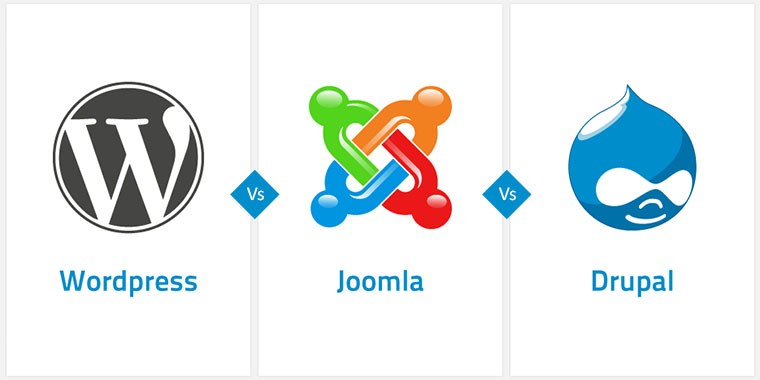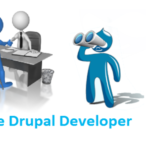
When planning to build a website, the first question that hits the mind is, which CMS to choose? Business owners always struggle towards deciding the right CMS for the foundation of their business. The three major players in the race of top CMS count to be WordPress, Joomla and Drupal. Out of these three, businesses would love to choose the one that makes task easier, simplified, quick and trustworthy.
In this blog, we have shared the advantages, disadvantages of each CMS along with the tips on choosing the right CMS for your small business website. Let’s take a quick look:
Overview
When it comes to technology, community and philosophy, all the three CMS, i.e WordPress, Joomla and Drupal have more or less in common. Each of them are open source in nature and free to use. They come with some great capabilities and are designed on PHP. The use of themes and templates is encouraged in all three CMS to add more appeal and functionality to the website.
In addition to being similar in multiple aspects, these popular CMS’s also differ from each other.
The table given here summarizes the key differences which sets each of the CMS apart:
| Aspects | WORDPRESS | JOOMLA | DRUPAL |
| Home Page | www.wordpress.org | www.joomla.org | www.drupal.org |
| Usage and simplicity | UI designed is simple, clear and intuitive. Easy to set up without any technical expertise. | Slightly complex to use. UI can be a little disturbing for a non-technical user. Requires time to get aware of the platform and terminology. | Requires loads of technical expertise. UI is clean and structured when adding content, however, complicated when it comes to editing or changing the appearance. |
| Single click Installation | Yes | Yes | Yes |
| Total plugins | 45000 and above plugins | 32000 modules and above | 7000 and above extensions |
| Themes available | 2000+ | 1000+ | 1800+ |
| SEO friendliness | Excellent | Basic | Good |
| Speed | Better hosting plans required to improve traffic | Can make proper use of resources rapidly, if not adjusted properly | Loads quickly and has faster response time. |
| Responsive | Yes | Yes | Yes |
| eCommerce | With WooCommerce | Extensions available for managing product and content. | The advanced version: Drupal 8 does not support a stable eCommerce module. |
Now, let’s go through each of these CMS in detail
WordPress
Empowering 30% of websites, WordPress incepted as a simple blogging platform but now has emerged as an advanced CMS capable of handling websites like TechCrunch and Time Inc. It comes with a smooth learning curve and a user-friendly interface that makes adding functionalities to the CMS quick and simple.
Advantages:
- Customizable: By using WordPress themes and plugins, it becomes easy to create a custom-made website specifically targeted to your own business.
- Free: WordPress is an open source platform to work with and is completely free of cost.
- Community support: WordPress support forum is filled with talented WordPress experts who are ready to answer your queries in the shortest possible time.
- Ease of use: As discussed above, WordPress is completely easy to use CMS that can even be used by a novice user. The dashboard is quite intuitive and requires no technical knowledge.
There are some disadvantages associated with the CMS as well. Its API is not user-friendly which means it is a difficult task to change the back-end and core of website whenever such issues arise.
WordPress is an ultimate choice for starting your business website, especially if a blog-website is being created or for addition of some extra functionality.
Joomla
Joomla is a complex CMS that is helpful in designing complex websites. The framework does not require much technical knowledge as Drupal.
Advantages:
- Social friendly: Joomla makes it easy to create social networking websites. In short, it can be a powerful CMS for creating social networking websites.
- Not very technical: Joomla is slightly technical than WordPress. It can still be accessible via individuals having lesser knowledge of the CMS. Therefore, it is a beginner-friendly CMS.
- Ecommerce website: With Joomla, creating an eCommerce website is far simpler and easier. Joomla has native support for developing eCommerce websites.
- Free: Joomla is free to use.
- Great community support: Joomla has a great support for community. So, asking questions and getting technical-support becomes easy. It is quicker and cost-effective than Drupal and other CMS.
When it comes to the disadvantages, Joomla has limited SEO capabilities that require extensive work for the developer to achieve the same level of SEO friendliness as WordPress and other CMS.
Its learning curve is a little complicated and requires some time to get familiar with the platform.
Joomla has comparatively less themes and modules than WordPress, however, if you are looking for premium-quality themes, you can find them on ThemeForest.
Drupal
With 8% of websites being developed on the CMS, Drupal counts to be effective and extremely powerful for developing large and complex websites of varied nature. Some of the great advantages offered by the CMS are:
- Heightened performance: This is one the paramount features that helps in delivering websites that load faster in comparison to Joomla and WordPress.
- Free: Drupal is completely free to use.
- Flexibility: With over 7000 extensions and 2000 themes, Drupal is a customizable platform that allows editing the core files with relative ease. It is, therefore, the most flexible CMS.
- Huge community support: Drupal support is available at Drupal.org and Stack Exchange and many other sites.
Drupal’s only disadvantage is that it features a steep learning curve. When it comes to creating a website of enterprise level, you will definitely be requiring technical support. With Drupal modules and tutorials available online, it becomes easy to acquire support.
Final verdict:
Well, there is no universal answer. The answer just boils down to the requirements of a business. As WordPress can be a great CMS for all startup businesses, Drupal and Joomla can be the definite choice for complex and mid-sized businesses. Similarly, while considering technicalities, Drupal is for all those tech-savvy who handle the tech sides and WordPress is definitely for all those who aren’t tech-savvy and are looking for easy and simple CMS.
In all, you need to consider few points like, business objectives, budget and level of technical expertise to choose amongst the 3 popular CMS.
Posted By: HireWebDeveloper Team– Contact Us to Hire WordPress Developer.





































